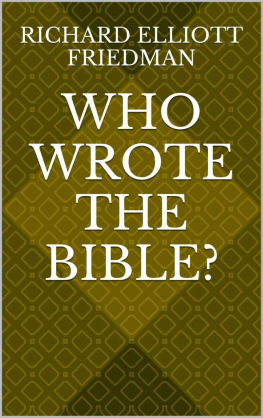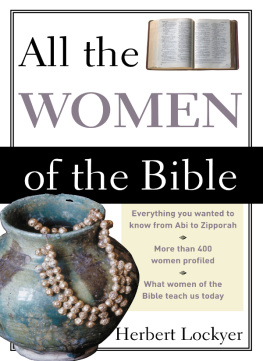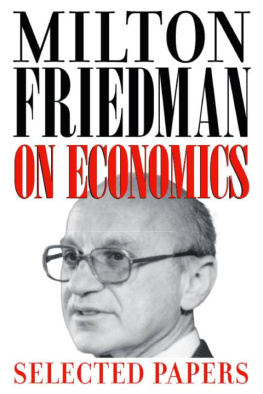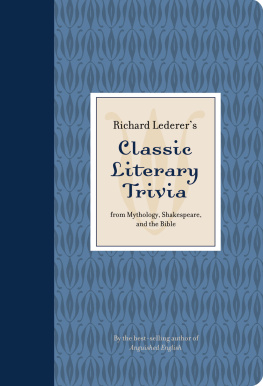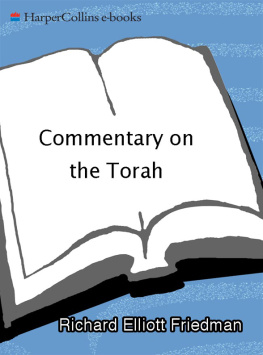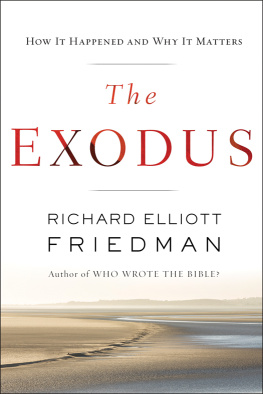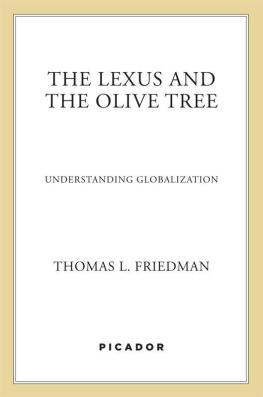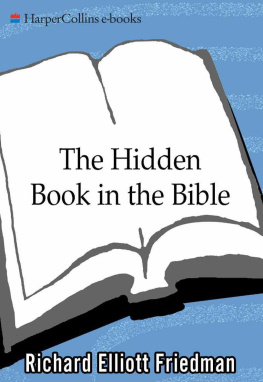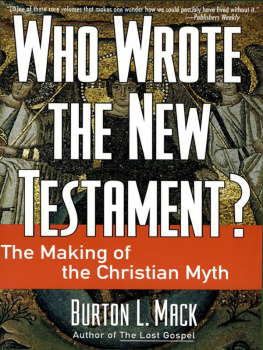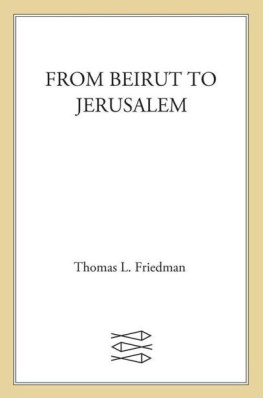
WHO WROTE THE BIBLE?
RICHARD ELLIOTT FRIEDMAN
1987, 2011 Richard Elliott Friedman. All rights reserved.
Preface to the second edition 1997
Friedman has gone much further than other scholars in analyzing the identity of the Biblical authors. Provocative. Promises to rekindle heated debate about the Good Books origins.
U.S. News & World Report
One of the most dramatic reappraisals of the Old Testament in recent times.
The Independent, London
There is no other book quite like this one. It may well be unique. brilliantly presented
Los Angeles Times
intriguing thought provoking enjoyable If you have ever thought biblical scholarship as dry as dust, then join detective Friedman as he tracks down his elusive authors. He has an eye for clues the average reader passes over unnoticed, and a lively style illumined by apt contemporary allusions.
New York Times
Controversial. Now the documentary theory is entering the public arena. Thats because of Mr. Friedmans book.
The Wall Street Journal
A fascinating and brilliant book, full of new insights and fresh discoveries. Reads like a detective story.
Frank Moore Cross, Hancock Professor of Hebrew & Other Oriental Languages, Harvard University
What is remarkable about this book is that Friedman manages to do a number of things simultaneously and well. It renders the Bible both more interesting and more helpful in dealing with the complex issues of our time.
Toronto Globe and Mail
A notable contribution to efforts to solve the riddle that biblical researchers, historians, archaeologists and people of faith have labored to solve for nearly a thousand years.
Maariv, Israel
Remarkable. Friedman has written that most rare of books: a legitimate intellectual contribution that is also a good read. The field of biblical studies will be enriched by this book.
Dallas Times Herald
An outstanding cultural contribution. Friedman brings this material to life with a keen instinct for holding off the disclosure of each discovery until exactly the right moment. This book could make Sunday School as exciting as Saturday night.
Kirkus Reviews
A tour de force.
Catholic Biblical Quarterly
Illuminating. There is no doubt that Who Wrote the Bible? is an important book, both for its subject matter and for Friedmans deft handling of the material. There is simply nothing like it for the general public.
Bnai Brith Magazine
This book is dedicated to
Reva A. Friedman and Laraine Friedman Linn,
with love.
Contents
IT HAS BEEN ten years since I finished this book. Some interesting developments have occurred since then, and it is also interesting to observe some things that did not happen. Notably, I had feared that many of my colleagues in the field of biblical scholarship might dismiss the book as popularthe ultimate condemnation in the academic world. But that has generally not been the case. It has been cited and quoted, it is assigned in classes at universities and seminaries, and colleagues have been extremely complimentary and encouraging in comments and letters. In this second edition, I want to express my gratitude to my colleagues for the treatment they have accorded this book. As I indicated in the original preface ten years ago, I believe that this knowledge is important to a much larger community than just scholars and clergy. My aim was not to write a popular book but rather an accessible one, to open this knowledge up to anyone who wanted to learn about it, and to show why it is so valuable and interesting. The original American and British editions carried on their covers endorsements from scholars at major universities and Christian and Jewish seminaries in order to convey to both scholars and laypersons that this was in fact accessible scholarship on the Bible and not a watered-down popularization of fringe theories.
There have been exceptions, of course. For those colleagues who have felt free to dismiss this presentation, my ego can take it if they choose not to cite this book because of its style. But it would be a shame if they failed to come to terms with the evidence and the arguments that are contained here. For those who do not feel obligated to address works that are popular, there are my more academic publications, and I have now assembled the data in the traditional, unembellished manner of scholarship in my entries in the Anchor Bible Dictionary. The entry on Torah, in particular, is meant to be the largest collection of evidence to date in support of the hypothesis.
Another development had been anticipated but did not occur: there has been surprisingly little polemic. A very positive article on the front page of the Wall Street Journal spoke of how this book was bringing the scholarly debate into the public arena and foresaw considerable controversy. A story in U.S. News and World Report said that this book promises to rekindle heated debate about the Good Books origins. And a rather more inflammatory article in the London Sunday Times predicted, The religious world is about to be rocked. But the response on the whole has been much kinder than expectedagain with a few exceptions. Though this book presents the results of critical biblical scholarship, which challenge traditional beliefs about the Bibles authorship, many pious fundamentalist Christians and orthodox Jews have shown great courtesy and have behaved graciously. I hope that this is because I do not present these things as an attack or a breaking-down, nor does this book reflect a lack of appreciation and reverence for the Bible. Anyone who cites this book in order to support such an attack is abusing the book and missing the point. The first and last pages of this book recognize the greatness of the Bible, its beauty and its power. What comes in between is a picture of how critical biblical scholarship accounts for this greatness. Years ago I studied in a class that was taught by an extremely pious orthodox rabbi, a gentle soul who came to teach people who were not orthodox like himself. When a student in the class declared, I disagree, the rabbi said, Thats what I learned in this place: that I can sit with people with whom I disagree and study together. We can all learn from him that people can disagree strongly in matters of religion and still not be enemies.
One point in this book that did give birth to some controversy was the suggestion I made that one of the biblical writers in particular (the author of the text known among scholars as J) may have been a woman. This became a subject of much debate as other scholars, drawing on my research, latched onto this idea. I would just warn that I proposed this tentatively and cautiously. I thought, and still think, that biblical scholars had made an error in too easily assuming that the authors of these biblical books were male. Determining, if possible, if the writer was male or female seems to me to be at least as important as determining whether the author was a priest or layperson, upper or lower class, or from the eighth century B.C. or the fifth. Nonetheless, I was saying only that we must fairly recognize this possibility. Those who borrowed this idea and blew it up from a possibility into a major conclusion have enjoyed the fruits of temporary publicity but have not helped us to advance our knowledge of the subject.

